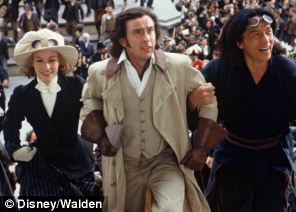Man’s mission to prove Phoenicians discovered the Americas a thousand years before Columbus
- Former City fund manager Philip Beale built replica Phoenician vessel
- Believes 50-tonne wooden boat could have crossed the Atlantic
- Will set sail from Tunisia to try and prove the theory himself
By STEVE ROBSON
Christopher Columbus and his discovery of the Americas in 1492 is one of the great stories of modern history.
But five centuries after his momentous achievement, a British explorer wants to prove that Columbus was actually beaten to it by another seafaring nation 1,000 years earlier.

Explorer Philip Beale, wants to prove that the ancient civilisation the Phoenicians discovered America before Christopher Columbus in 1492,

Christopher Columbus.

Mr Beale built The Phoenician in 2008 exactly as it would have been 2,600 years ago
And the former City fund manager from Lulworth, Dorset, wants to prove it by sailing a replica boat he built exactly as it would have been 2,600 years ago across the Atlantic.
‘It is one of the greatest voyages of mankind and if anyone could have done it [before Columbus], it was the Phoenicians,’ Beale told CNN.
‘Of all the ancient civilizations they were the greatest seafarers — Lebanon had cedar trees perfect for building strong boats, they were the first to use iron nails, and they had knowledge of astrology and currents.’

The Phoenician covered more than 20,000 miles when Mr Beale sailed it around Africa in 2008
The theory that an Israelite race discovered the Americas before Columbus was popular in the 18th and 19th centuries after several ancient inscriptions were found in North America which were said to be Hebrew.
But many historians still doubt that the Phoenicians were capable of such a treacherous journey.
Mr Beale has already been on an epic voyage in his 50 tonne wooden vessel – aptly named The Phoenician – after he sailed it around Africa in 2010.
ADVENTURES OF PHILEAS FOGG

Traveller: Steve Coogan (centre) as Phileas Fogg in Around the World in 80 Days with Cecile de France and Jackie Chan
Phileas Fogg is a fictional character who is the star of the 1873 Jules Verne novel ‘Around the World in Eighty Days.’
In the book, which has been made into several films – including one starring Steve Coogan (above) – Fogg attempts to circumnavigate the world in eighty days, or less, for a wager of £20,000 with members of his London club.
He vows to return to the club by 8.45pm on Saturday 21 December 1872. He is followed by a detective named Fix during his journey who suspects him of robbing the Bank of England.
While in India Fogg meets Aouda, a widowed princess, and saves her from being burned to death during her husband’s funeral. She then travels with Fogg for the rest of his journey.
She and Fogg eventually fall in love and marry. Fogg arrives home thinking he has lost his bet – but he eventually finds out that he won.
He hired archaeologists and traditional shipwrights to construct the boat based on the design of an ancient galley found wrecked in the western Mediterranean.
It is almost 65ft in length, with a single sail and emergency oar holes for when the wind dropped.
Then, like a modern-day Phileas Fogg, he set sail in it to prove that the fabled voyage was possible using only the power of the wind and the tide.
He wanted to demonstrate that the Phoenicians – referred to in the Bible as ‘rulers of the sea’ – had the capability to circumnavigate the continent 2,000 years before the first recorded European which was Bartolomeu Dias in 1488.
Setting sail from Syria in 2008, he covered 20,000 miles over two years, battling everything from six-metre waves off the Cape of Good Hope to Somali pirates.
And now he is willing to do it all again, provided he can raise the £100,000 he needs for the trip.
The odyssey is expected to take two to three months, setting sail from Tunisia and arriving in America via the Atlantic Ocean.
He has also been invited by New York’s Metropolitan Museum of Art to be part of the museum’s landmark exhibition on the Phoenician civilisation, opening in September 2014.
‘The conventional wisdom is that Christopher Columbus discovered America.
But anyone who looks a little closer will see the Vikings were there around 900AD.
They’ve found Viking settlements in Newfoundland, it’s undisputed,’ Beale told CNN.
‘So Columbus was definitely second — at best. I put forward the theory that the Phoenicians could have been first and I hope to prove that was the case.’




